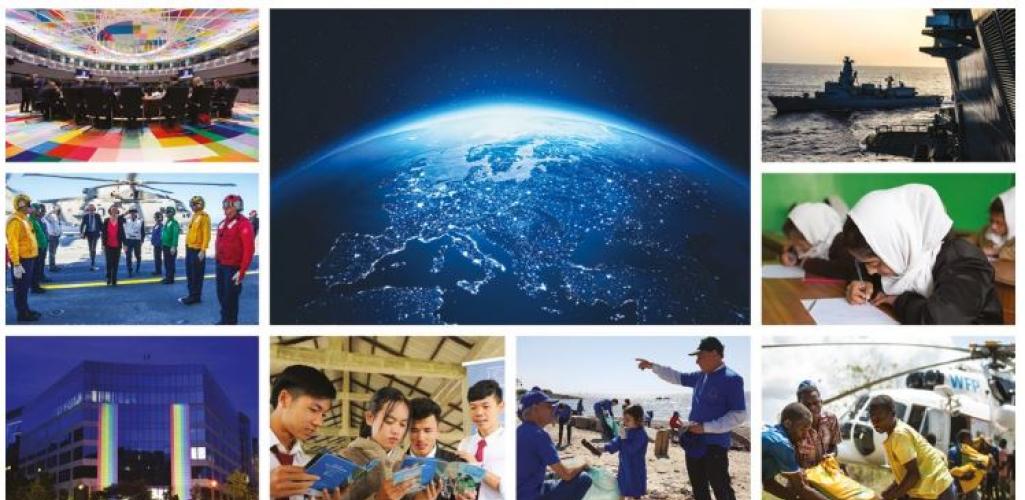Legacy
The European Union as a global partner
The EU Global Strategy helped make our Union more effective in confronting energy security, migration, climate change, violent extremism, and hybrid warfare. Because none of our countries could tackle these challenges alone, we took steps to solve them together. We navigated this difficult, more connected contested and complex world guided by our shared interests and principles. We stood united in building a stronger Europe.
From Vision to Action
Priorities of the EU Global Strategy
|
We need a strong European Union like never before. It is what our citizens deserve and what the wider world expects. The European project which has brought unprecedented peace, prosperity and democracy is being questioned. To the East, the European security order has been violated, while terrorism and violence plague North Africa and the Middle East, as well as Europe itself. Yet these are also times of extraordinary opportunity. Global Growth, mobility, and technological progress – alongside our deepening partnerships- enable us to thrive, and allow ever more people to escape poverty and live longer and freer lives. The EU Global Strategy seeks to turn vision into common action. In October 2016 EU Foreign ministers decided on the most important strategic priorities for implementing the EU Global Strategy (Council Conclusions in October 2016). These priorities are security and defence, building state and societal resilience, taking an integrated approach to conflicts and crises, strengthening cooperative regional orders and a rules-based global governance. |
Security and Defence
Decisive steps are being taken on Security and Defence
In November 2016, EU Foreign and Defence ministers decided on a new level of ambition and key steps to upgrade cooperation to ensure the Security of our Union in line with the Global Strategy (Council conclusions). These Conclusions were based on former HRVP Federica Mogherini's Implementation Plan on Security and Defence. This aims to improve the protection of the EU and its citizens, help governments jointly build military capacity, and develop better response to crises. Further actions to step up EU Security include the European Defence Action Plan, which proposes financial help for Member States for more efficient joint procurement and capability development, and steps to put into effect the EU-NATO Joint Declaration.
State and Societal Resilience
Building resilience at home and abroad to create a more responsive union
The EU will strengthen the resilience of states and societies by supporting good governance, accountable institutions, and working closely with civil society.
The High Representative and the European Commission launched a Joint Communication on Resilience that aims to further enhance common action on building resilience on the ground.
Our support will target in particular the EU's surrounding regions in the East and the South, spanning from Central Asia to Central Africa.
Integrated Approach to Conflicts and Crisis
The framework for a more coherent and holistic engagement
The EU also supports an integrated approach to conflicts and crises, which means being fully engaged in all stages of a conflict, from early action and prevention, wherever possible to staying on the ground long enough for peace to take root. A particular emphasis is placed on early warning and risk assessment.
A Rules-based Global Governance
Guided by the values on which it is founded, the EU is committed to a rules-based multilateral international order
The Union regards the respect for and promotion of international law - including the principles of the UN Charter – to be crucial for preserving peace, human rights, sustainable development and lasting access to the global commons. Multilateral organisations – in particular the United Nations – sit at the heart of this framework of international norms. They are providers of global governance as well as fora for the peaceful resolution of disputes and jointly tackling global challenges. To strengthen rather than just preserve the rules-based multilateral system, the European Union is committed to reform, transform, and further expand the existing system. The European Union leads by example with the implementation of new and reinvigoration of existing multilateral projects like the Paris Agreement, the Sustainable Development Goals, as well as the global effort on nuclear non-proliferation and disarmament. We will seek to widen the reach of international norms and institutions. Not only is the EU committed to living up to its obligations under such regimes, rather it will strongly support expanding their membership, universalisation, full implementation, and enforcement.
Public Diplomacy
In a more connected world, it is important to project a clear vision of what the EU stands for and seeks to achieve in the world
|
In a more connected world, it is important to project a clear vision of what the EU stands for and seeks to achieve in the world. The EU is working closely with state and non-state partners, as well as boosting EU study exchanges, alumni networks and youth initiatives. Promoting EU programmes such as Erasmus+, the flagship study programme and Horizon 2020, a multi-billion EU Research and Innovation programme, is also an important part of EU public diplomacy. |
Related resources
The strategy document ‘A Global Strategy for the European Union's Foreign and Security Policy’ was published in 2016. The implementation reports describe the Strategy's visions turning into action.
A Global Strategy for the EU's Foreign and Security Policy, June 2016
All Languages - EU Global Strategy in all EU languages and more
Implementation Plan on Security and Defence, November 2016
Implementing the EU Global Strategy - report Year 1, June 2017
Implementing the EU Global Strategy - report Year 2, June 2018
The European Union's Global Strategy : Three years on, moving forward, June 2019



